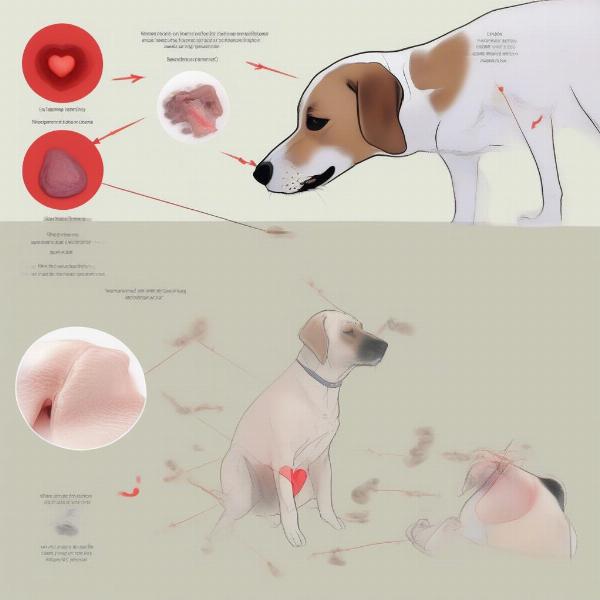Doxorubicin, also known as Adriamycin, is a potent chemotherapy drug used in veterinary medicine to treat various cancers in dogs. Understanding how doxorubicin works, its potential side effects, and how to care for your dog during treatment is crucial for pet owners facing a cancer diagnosis. This guide will provide you with comprehensive information about doxorubicin for dogs, equipping you with the knowledge you need to make informed decisions and navigate this challenging time.
Understanding Doxorubicin and its Uses
Doxorubicin belongs to a class of drugs called anthracyclines, which work by interfering with the growth and spread of cancer cells. It’s particularly effective against rapidly dividing cells, which makes it a useful tool in treating a range of canine cancers, including lymphoma, osteosarcoma, hemangiosarcoma, and bladder cancer. Doxorubicin is usually administered intravenously by a veterinarian. The dosage and frequency of administration will depend on the type of cancer being treated, the dog’s overall health, and other factors.
Potential Side Effects of Doxorubicin in Dogs
While doxorubicin can be a life-saving treatment, it’s essential to be aware of its potential side effects. Some dogs experience mild side effects, while others may have more severe reactions. Common side effects include:
- Gastrointestinal upset: Vomiting, diarrhea, loss of appetite.
- Bone marrow suppression: Decreased production of red and white blood cells, leading to anemia, increased risk of infection, and potential bleeding problems.
- Hair loss: This is less common in dogs than in humans.
- Cardiotoxicity: Doxorubicin can damage the heart muscle, particularly at cumulative high doses. Your veterinarian will monitor your dog’s heart function closely throughout treatment.
 Common Side Effects of Doxorubicin in Dogs
Common Side Effects of Doxorubicin in Dogs
Managing Side Effects and Caring for Your Dog
Your veterinarian will work with you to develop a plan to manage any side effects your dog experiences. This may include medications to control nausea and vomiting, supportive care to manage bone marrow suppression, and regular monitoring of heart function. Providing a comfortable and supportive environment at home is crucial for your dog’s well-being during treatment. Ensure they have a quiet place to rest, offer easily digestible food, and monitor their water intake.
What should I ask my vet about doxorubicin?
What are the potential benefits of doxorubicin for my dog’s specific cancer? What are the risks and side effects associated with doxorubicin treatment? How will my dog’s heart function be monitored during treatment? What are the alternative treatment options available? What is the expected prognosis with and without doxorubicin treatment?
Long-Term Monitoring After Doxorubicin Treatment
Even after doxorubicin treatment is complete, regular veterinary check-ups are crucial to monitor for any long-term effects, particularly cardiotoxicity. Your veterinarian may recommend periodic blood tests and cardiac evaluations to ensure your dog remains healthy.
Conclusion
Doxorubicin can be a valuable tool in the fight against canine cancer. By understanding the drug’s uses, potential side effects, and how to provide supportive care, you can help your dog navigate this challenging journey. Open communication with your veterinarian is essential throughout the process. Remember, early detection and prompt treatment are crucial for the best possible outcome. Doxorubicin offers hope for dogs battling cancer, and with careful monitoring and supportive care, many dogs can live happy and fulfilling lives even after a cancer diagnosis.
FAQ
- What is doxorubicin? Doxorubicin is a chemotherapy drug used to treat various types of cancer in dogs.
- How is doxorubicin administered? It is usually administered intravenously by a veterinarian.
- What are the common side effects? Common side effects include gastrointestinal upset, bone marrow suppression, and potential cardiotoxicity.
- How can side effects be managed? Your veterinarian can prescribe medications and recommend supportive care to manage side effects.
- What is the long-term prognosis? The prognosis varies depending on the type of cancer and the individual dog’s response to treatment. Regular monitoring is essential.
- Is doxorubicin always effective? Doxorubicin is not always effective, but it can significantly improve the outcome for many dogs with cancer.
- What are the alternatives to doxorubicin? Other chemotherapy drugs, surgery, and radiation therapy are potential alternatives, depending on the type and stage of cancer.
ILM Dog is your trusted source for comprehensive and reliable information on dog care and well-being. We specialize in providing expert advice on Dog Breeds & Selection, Dog Health & Medical Care, Dog Training & Behavior, Dog Nutrition & Feeding, Dog Grooming & Hygiene, and Dog Products & Accessories. Contact us today to learn more about how we can support you and your furry friend. Email: [email protected] Phone: +44 20-3965-8624 Visit ILM Dog for more expert advice and resources.